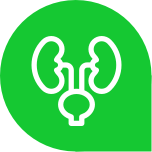fabrysymptoms.me
Symptoms
What are the signs & symptoms of Fabry disease?
Fabry disease is associated with a wide range of symptoms that can vary from day-to-day and person-to-person1.
Signs and symptoms of Fabry disease have been reported to begin at an early age, with a mean age of symptom onset of approximately 6 and 9 years in boys and girls, respectively2,3.
The signs and symptoms of Fabry disease affect a diverse range of organs4 and may include:

Circulatory System
Conduction abnormalities (problem with the heart’s electrical system), arrhythmia (abnormal heart rhythm), left ventricular hypertrophy (a specific part of the heart is enlarged, enlarged lower chamber of heart), ischaemia4 (part of the body isn’t getting enough blood)

Kidneys
Cysts (lumps/sacs filled with fluid, air or pus), albuminuria (too much albumin, a blood protein, in the urine), proteinuria (protein in the urine), progressive renal failure4 (kidney failure, loss of kidney function)

Eyes
Corneal opacities (or cornea verticillata) [scarring of part of the eye] and tortuosity (twisted) of conjunctival and retinal vessels1

Ears & hearing
Hearing impairment, vertigo (dizziness, loss of balance), tinnitus4 (ringing noise in the ear)

Digestive System
Abdominal (belly) pain, nausea, vomiting, constipation, diarrhoea4

Brain
Transient ischaemic attack (small loss of blood to part of the brain), stroke (sudden loss of blood to part of the brain), neuropsychiatric problems4

Skin
Angiokeratomas(red/purplish skin rash)4

Nervous system
Acroparesthesia (numbness, burning or tingling of the hands or feet), hypohidrosis (decreased sweating), temperature sensitivity(uncomfortable in high or low temperatures)1,4
Early symptoms often appear in childhood, and include chronic neuropathic pain, acute pain crises (extreme pain that begins suddenly), heat and cold intolerance, and fatigue5 .
Disease progression leads to a variety of systemic manifestations, including renal disease, cardiomyopathy (enlarged heart) and stroke (sudden loss of blood to part of the brain); and are often accompanied by depression4,5,6.
The progressive nature of Fabry disease means symptoms may become more frequent and severe with age7.






